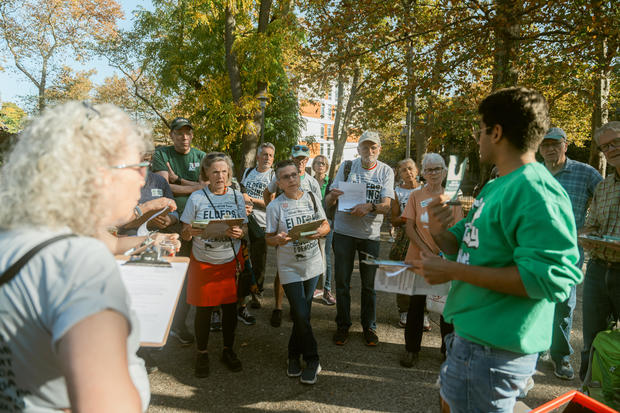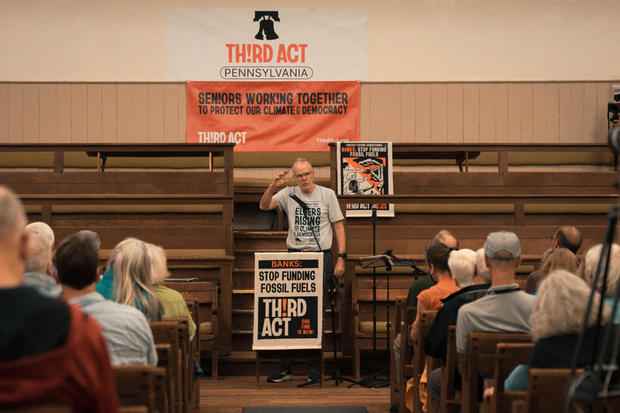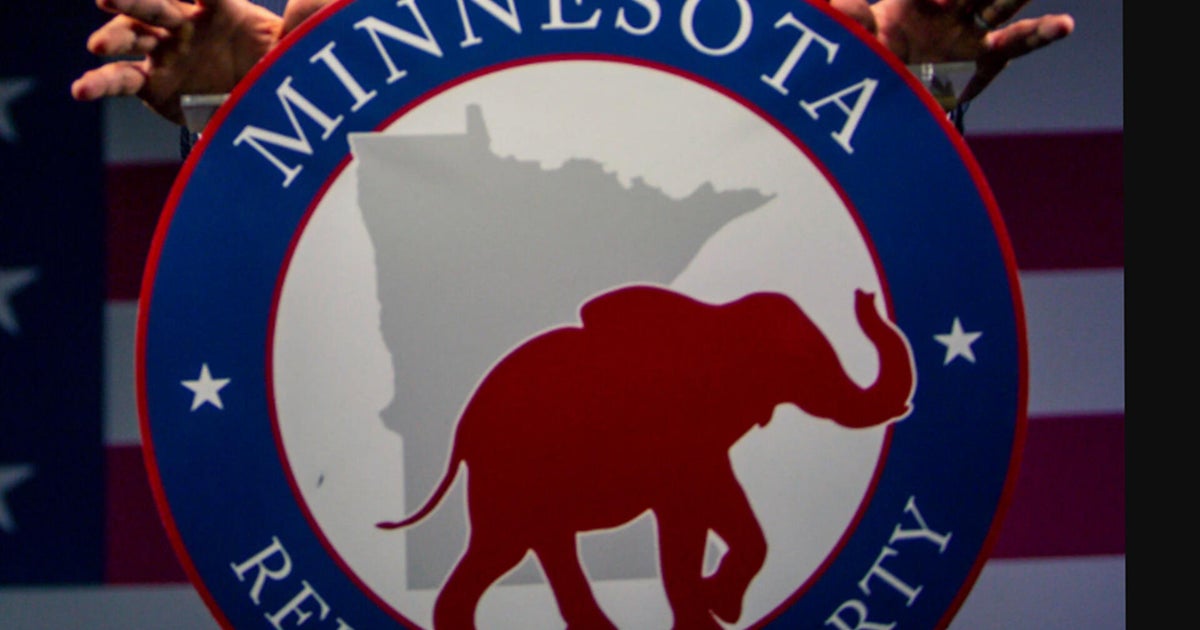Climate groups working to mobilize early voters and track new climate voters in battleground states
Across Philadelphia, dozens of silver haired, climate-conscious canvassers are going door to door in the last weeks before Election Day, leaving green slips of paper with guides on how to register to vote this year.
"It's the most consequential one that I've been a part of," climate canvasser Daniel Carlson told CBS News. "I've been voting for four decades."
Carlson is part of Third Act, a climate activist group for people over 60. The group is trying to mobilize voters on climate change in an election that's been dominated by worries about the economy, immigration and abortion access.
CBS News polling has found climate change is "not a factor" for 32% of voters in the presidential race, but for millions, it's their top issue, according to the Environmental Voter Project, another non-profit group; EVP works on identifying climate-minded voters and get them to the polls.
In particular, EVP focuses on low-propensity climate voters — those who did not vote in the last presidential election and are concerned about climate change.
Nathaniel Sinnett, executive director of the Environmental Voter Project, said, "In Pennsylvania, we've identified 245,000 of these voters," Sinnett told CBS News, and he's found equally high numbers in other key battleground states where EVP is active. In 2020, Joe Biden's margin of victory over Donald Trump in Pennsylvania was 80,555.
EVP says it uses predictive modeling and data analytics to identify millions of climate-focused registered voters, and then it relies on voter files to target its efforts toward environmentalists who are registered to vote but who have not been voting.
"We really like what we're seeing in the early voting, nearly 130,000 first-time climate voters have already cast ballots in the 19 states where we work," says Sinnett. Five of the states where EVP is tracking voters are battleground states — the group says it has identified hundreds of thousands of low-propensity climate voters in these battleground states:
- Arizona: 229,311
- Georgia: 491,369
- Nevada: 108,694
- North Carolina: 266,227
- Pennsylvania: 245,206
Sinnett acknowledged these models and data don't guarantee a climate vote is a vote for the Democratic ticket, but early voting and environmental voters have historically leaned liberal.
EVP tracks the voters it's identified and whether they've cast a ballot, and on a more granular level, the group is tallying the climate-focused voters they've found who did not vote in 2020 but cast a 2024 ballot during early voting this fall. Based on early voting returns, according to Sinnett, in some battleground states, climate voters are turning out at higher rates than the general electorate.
EVP has identified nearly 230,000 first-time climate voters in Arizona in 2024, and as of Oct. 25, EVP has seen 5,514 of those individuals cast early ballots. In 2020, Arizona was decided by fewer than 11,000 votes. The group is seeing similar returns in other battleground states and hopes its efforts will help nudge climate-friendly candidates to victory.
"Climate voters are not the largest voting bloc in the country," said Sinnett. "But this fall, climate voters can have a real impact on the margins, and in an election where all seven swing states are statistically tied, a little movement in the margins will decide everything."
Third Act is another environmental group working on turning out climate-concerned voters, but its focus is on older Americans. It was founded by Bill McKibben, an environmentalist who has written more than a dozen books on the topic and has organized climate protests all over the world. Although climate politics is often associated with young voters, McKibben thinks his generation has a unique perspective, having seen the civil rights movement and the conservation movement of the '60s, '70s and '80s.
"In the course of our lifetimes, we've seen a lot of change, and much of it for the better. You know, when I was born, Kamala Harris and her husband couldn't have been married in half the states."
Like EVP, McKibben and his group have run into some reluctance by many climate-minded Americans to show up to the polls.
"They care deeply about the climate, but maybe they're just decided there's nothing that can be done, or whatever it is. So, we've got to reach them and just say this isn't everything," McKibben told CBS News. "The purpose of an election is not salvation."
Environmental salvation is likely on Carlson's mind, though. The 60-year-old is a pastor by day, and he decided to make the trip from Schenectady, New York to Philadelphia to doorknock for the first time — he says he's trying to do his part to help boost turnout in a consequential election.
"The world that my generation will leave to the next generation is definitely compromised and damaged in some really considerable respects, but I want to do all that I can to be of as much help as I can to the generations that are to come."
Helen Grady, 85, a former Philadelphia school teacher, was also motivated to start canvassing when she heard many college students were considering not voting.
"That really angers me, and it frustrates me when I hear somebody say, there's no point to voting because both sides are broken," she told CBS News. "I used to tell my high school students, 'you don't vote, you can't complain.'"





